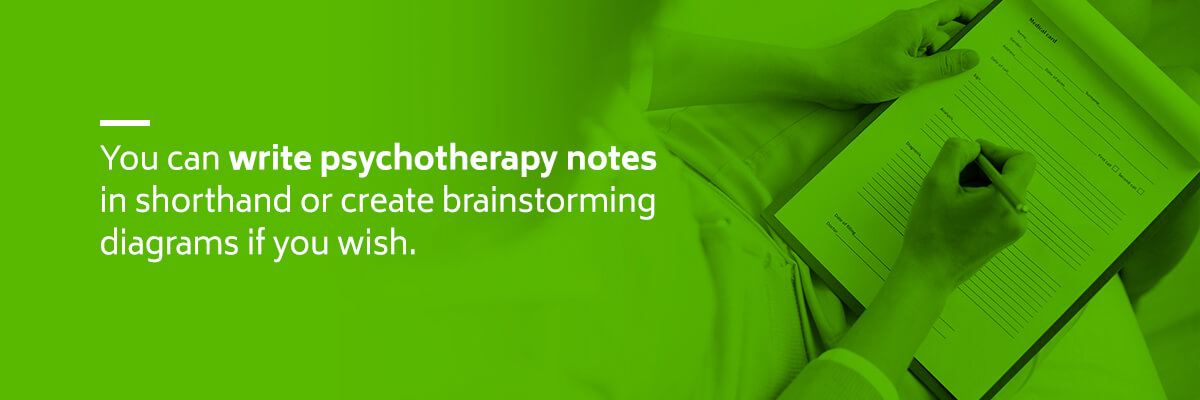How to Create a Psychotherapy Note
Mental health professionals have a lot of details to remember about many different clients. Some therapists might see over 20 clients a week, yet they need to know each person as if they didn't have a full schedule. Writing psychotherapy notes is a way for counselors to grasp their clients' conditions to provide optimal care.
If you're considering writing psychotherapy notes to enhance the services you provide, you need to know a few things about this note-writing form.
Table of Contents
- What Is a Psychotherapy Note?
- How Are Psychotherapy Notes Different From Progress Notes?
- How Do You Write a Psychotherapy Note?
- What Shouldn't Be Included in a Psychotherapy Note?
- Are Psychotherapy Notes Covered Under HIPAA?
- How Long Do I Keep Psychotherapy Notes?
- Essential Considerations for Writing Psychotherapy Notes
- Writing Psychotherapy Notes With ICANotes EHR
What Is a Psychotherapy Note?
Psychotherapy notes are a counselor's private notes written during or after a counseling session. Unlike other forms of clinical documentation, psychotherapy notes are optional. They may be used to help a therapist analyze a session's content, form an impression or explore their thoughts and feelings about a client and their condition.
If you decide to write psychotherapy notes, you may find them helpful in gaining a clearer understanding of your clients and the treatment they need. You can record psychotherapy notes in any medium you prefer, such as a notepad or laptop, as long as you keep the notes separate from clients' medical records.
How Are Psychotherapy Notes Different From Progress Notes?
Psychotherapy notes are not meant to be shared with others, unlike progress notes. Progress notes are legal documents that belong in a client's medical records and can be read by clients and other clinicians involved in a patient's treatment. Progress notes are also required for ethical and legal purposes.
Therapists keep progress notes to plan and document treatment and determine if therapy is helping a client improve. Counselors also keep progress notes to protect themselves legally, get reimbursed by insurance companies and coordinate care with other healthcare providers.
Progress notes are brief and typically follow a standard format to easily communicate them to clients, clinicians and insurance companies. For example, behavioral health professionals often use the subjective, objective, assessment and plan (SOAP) format to write thorough and well-organized progress notes.
Unlike psychotherapy notes, progress notes must be easy to read so clinicians can quickly understand a client's medical history and current condition. Also, with the 21st Century Cures Act's information blocking rule, healthcare providers are required to give clients access to their medical records in the electronic health record (EHR) system, including their progress notes. Psychotherapy notes are exempt from the information blocking rule as long as they are kept separate from clients' medical records.
How Do You Write a Psychotherapy Note?
Since psychotherapy notes are optional, there is no specific format you need to follow, nor do these notes need to be legible to others. For example, you can write psychotherapy notes in shorthand or create brainstorming diagrams if you wish. Regarding what you should write about, here's what you might include:
- Your observations about a client
- Your hypotheses or ideas
- Questions to ask your supervisor
- Topics you want to research
- Any thoughts or feelings you have about a therapy session and a client
What Shouldn't Be Included in a Psychotherapy Note?
Even though psychotherapy notes are not legal documents like progress notes, there are still a few rules to consider. These rules establish your psychotherapy notes as your private notes and not medical records. According to the Health Insurance Portability and Accountability Act (HIPAA) Privacy Rule, psychotherapy notes must exclude the following information to be considered personal documents and not part of a client's medical record:
- Medications
- Medication monitoring
- Session start and stop times
- Clinical test results
- Treatment methods and frequencies
- Diagnosis
- Treatment plan
- Symptoms
- Functional status
- Prognosis
- Progress
Are Psychotherapy Notes Covered Under HIPAA?
Yes, psychotherapy notes are covered under HIPAA, and there are protections for both therapists and clients. First, therapists are not required to share their private notes with clients, insurance companies, other healthcare providers or anyone else. But if a client requests to see a counselor's psychotherapy notes, the counselor can choose to share the notes if they wish.
Regarding clients' rights, a counselor cannot share their psychotherapy notes without obtaining the client's consent first — with a few exceptions. Therapists may not need a client's authorization if they receive a court order.
How Long Do I Keep Psychotherapy Notes?
Because psychotherapy notes are optional, there is no rule that states you must keep them for a specific amount of time. With that said, you may want to get rid of psychotherapy notes that are no longer helpful to you to eliminate the risk of someone else reading them. But older psychotherapy notes may help you treat a particular client at a later time, depending on their needs. It's up to you to decide whether psychotherapy notes are worth keeping.
The American Psychological Association (APA) provides general record-keeping guidelines you can apply to your psychotherapy notes if you prefer. According to the APA's guidelines, psychologists might retain an adult client's complete records for seven years after the last session or until three years after a minor reaches adulthood.
How Should I Dispose of Psychotherapy Notes?
If you decide to dispose of your psychotherapy notes, you'll want to implement the same safeguards you'd use for any client record to keep the information confidential. For instance, if you write psychotherapy notes on paper, consider shredding the notes when you no longer need them before throwing them away. Regardless of the disposal method you choose, it's essential your notes are unreadable and cannot be reconstructed before placing them in the trash.
If you store your psychotherapy notes electronically, ensure your system is secure before deleting files. HIPAA provides examples of proper disposal methods for both paper records and electronic media.
Essential Considerations for Writing Psychotherapy Notes
In general, you're free to include your ideas, opinions, feelings and other information that's not appropriate for medical records in your personal notes. But there are still a few things you'll want to keep in mind:
- Someone might read your psychotherapy notes: You can include thoughts and feelings you would not put into a client's progress notes. Still, you'll want to be careful with incriminating information because someone might read your notes under specific circumstances. Your private notes can be subpoenaed if there's concern about public safety. So it's best not to include anything in your notes you wouldn't want a judge to see.
- You should keep them separate: It's a good practice to keep psychotherapy notes separate from a client's medical records. If your psychotherapy notes are not distinguishable from a client's progress notes or general chart, they will be considered part of their medical record. They can then be disclosed to other healthcare providers or insurance companies without the client's authorization.
- You still need to maintain confidentiality: Even though psychotherapy notes are your private notes, you still need to keep them confidential without a client's consent. If you write in a notebook, make sure you do not leave it out in the open for others to read. If you use a computer to write and store psychotherapy notes, ensure the notes are password-protected.
Writing Psychotherapy Notes With ICANotes EHR
Using a HIPAA-compliant EHR system to write psychotherapy notes can help you maintain confidentiality effortlessly and efficiently. With ICANotes, you can write psychotherapy notes directly in your EHR and keep them separate and private. You can also rest assured your psychotherapy notes are secure and HIPAA-compliant.
To try ICANotes behavioral health EHR and see how it works, request your free trial or contact us today for more information.
Last updated July 23, 2021.
Related Posts
Billing Pitfalls for Mental Health Clinicians
What Is the Difference Between a Clearinghouse Rejection and a Payer Denial?
Biggest Challenges Behavioral Health Clinicians Will Face in 2021



